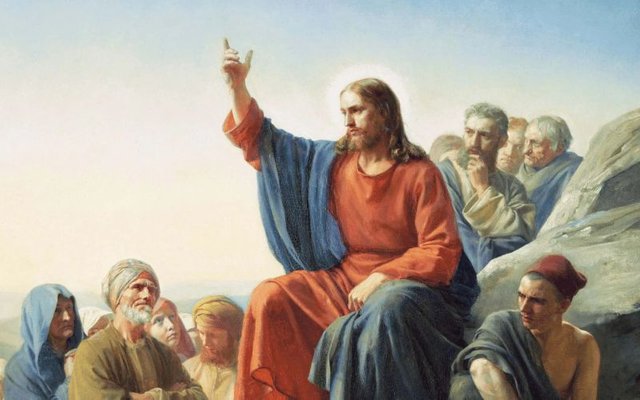En aquel tiempo, Jesús tomó aparte a Pedro, a Santiago y a Juan, subió con ellos a un monte alto y se transfiguró en su presencia. Sus vestiduras se pusieron esplendorosamente blancas, con una blancura que nadie puede lograr sobre la tierra. Después se les aparecieron Elías y Moisés, conversando con Jesús.
Entonces Pedro le dijo a Jesús: "Maestro, ¡qué a gusto estamos aquí! Hagamos tres chozas, una para ti, otra para Moisés y otra para Elías". En realidad no sabía lo que decía, porque estaban asustados. Se formó entonces una nube, que los cubrió con su sombra, y de esta nube salió una voz que decía: "Este es mi Hijo amado; escúchenlo". En ese momento miraron alrededor y no vieron a nadie sino a Jesús, que estaba solo con ellos.
Cuando bajaban de la montaña, Jesús les mandó que no contaran a nadie lo que habían visto, hasta que el Hijo del hombre resucitara de entre los muertos. Ellos guardaron esto en secreto, pero discutían entre sí qué querría decir eso de "resucitar de entre los muertos".
Le preguntaron a Jesús: "¿Por qué dicen los escribas que primero tiene que venir Elías?" Él les contestó: "Si fuera cierto que Elías tiene que venir primero y tiene que poner todo en orden, entonces ¿cómo es que está escrito que el Hijo del hombre tiene que padecer mucho y ser despreciado? Por lo demás, yo les aseguro que Elías ha venido ya y lo trataron a su antojo, como estaba escrito de él".
La exhortación a moderar la lengua es frecuente en la tradición sapiencial. Ejemplo: «Muchos cayeron por la espada, pero más numerosos aún son las víctimas de la lengua» (Sir 28, 18).
Cristiano es aquel que trata de dominarse a sí mismo y aspira a ser «hombre perfecto», custodio del propio comportamiento que –como aquí se nos dice– no pocas veces es indomable como un caballo, incendiario como el fuego y mortífero como un veneno. Alguien capaz de poner su lengua al servicio y alabanza de Dios y de un desinteresado servicio a los hermanos.

Imagen De Dominio Publico Fuente
At that time, Jesus took Peter, James, and John aside, went up a high mountain with them, and was transfigured in their presence. His clothes became splendidly white, with a whiteness that no one can achieve on earth. Then Elijah and Moses appeared to them, conversing with Jesus.
Then Peter said to Jesus: "Teacher, how comfortable we are here! Let's make three huts, one for you, one for Moses and one for Elijah." He didn't really know what he was saying, because they were scared. Then a cloud was formed, which covered them with its shadow, and from this cloud came a voice saying: "This is my beloved Son; listen to him". At that moment they looked around and saw no one except Jesus, who was alone with them.
As they came down the mountain, Jesus commanded them not to tell anyone what they had seen, until the Son of Man had risen from the dead. They kept this a secret, but discussed among themselves what "rising from the dead" meant. They asked Jesus, "Why do the scribes say that Elijah must come first?" He answered them, "If it were true that Elijah had to come first and set everything in order, then how is it that it is written that the Son of man has to suffer much and be despised? Otherwise, I assure you that Elijah has already come and they treated him as they pleased, as it was written about him."
The exhortation to moderate the tongue is frequent in the sapiential tradition. Example: "Many fell by the sword, but more numerous still are the victims of the tongue" (Sir 28, 18).
A Christian is one who tries to dominate himself and aspires to be a “perfect man”, a custodian of his own behavior which – as we are told here – is not infrequently indomitable like a horse, incendiary like fire and deadly like poison. Someone capable of putting his tongue at the service and praise of God and of selfless service to the brothers.
